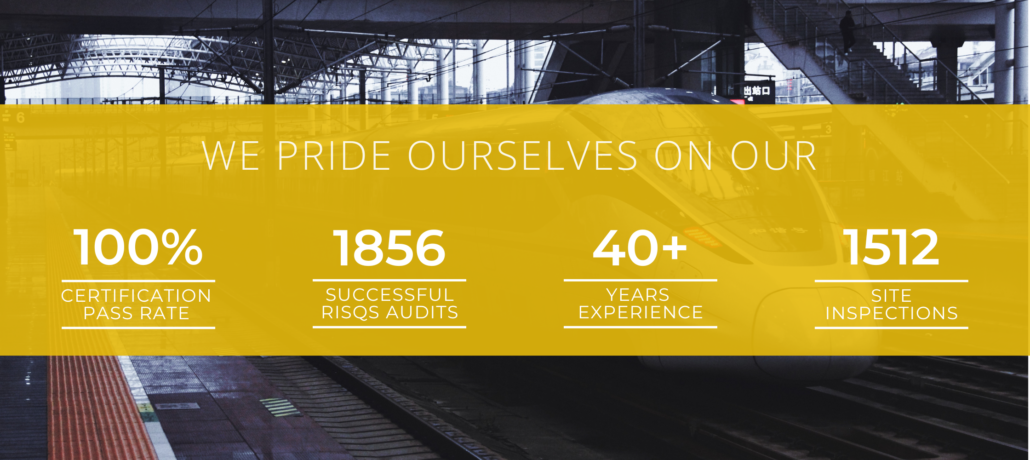Expert Insights: Q&A with Simpson Consultancy’s RISQS Specialists
Introduction:
Navigating the RISQS (Railway Industry Supplier Qualification Scheme) certification process can be daunting, especially for small and medium-sized businesses looking to enter the UK rail industry. To help demystify the process, we’ve compiled a Q&A with Simpson Consultancy’s RISQS specialists. This article addresses some of the most common questions from prospective RISQS certification clients, providing valuable insights and practical advice.
Q: What is RISQS certification, and why is it necessary for my business?
A: RISQS certification is the standard by which suppliers are pre-qualified to work within the UK rail industry. It is crucial because it demonstrates that your business meets the necessary safety, quality, environmental and operational standards required by major rail operators such as Network Rail and Transport for London. Without RISQS certification, your business may not be considered for most rail contracts, limiting your opportunities within this lucrative industry.
Q: What does the RISQS audit process involve?
A: The RISQS audit process is a comprehensive evaluation of your company’s management systems. It focuses on several key areas, including health and safety compliance, quality management, environmental practices, and operational processes. During the audit, assessors review your documentation, procedures, and on-site practices to ensure they align with industry standards. The goal is to verify that your business can safely and effectively operate within the rail network, which is a prerequisite for working in this highly regulated sector.
Q: How can my business prepare for a RISQS audit?
A: Preparing for a RISQS audit begins with conducting a thorough internal review of your management systems. Ensure all necessary documentation such as safety, quality and environmental management processes, training records are up-to-date and well-organised. It’s also beneficial to conduct a pre-audit assessment, either internally or with the help of a RISQS specialist, to identify and address any potential areas of non-compliance. Regular system review is critical to ensuring that your business is audit-ready.
Q: What are the most common pitfalls during the RISQS certification process?
A: Common pitfalls include inadequate documentation, no review of rail standards, insufficient employee training, and a lack of preparation for the audit itself. Many businesses also struggle with maintaining continuous compliance, which is crucial for passing the RISQS audit. Regularly reviewing and updating your processes, conducting internal audits, and ensuring that your documentation is comprehensive and current can help you avoid these common issues.
Q: How does RISQS certification impact my ability to secure contracts in the rail industry?
A: RISQS certification is often a mandatory requirement for bidding on rail contracts in the UK. Without this certification, your business is typically ineligible to work on most rail projects, which significantly limits your opportunities. However, being RISQS-certified positions your business as a trusted and reliable supplier, making it more likely that clients will consider you for contracts. This certification can open doors to a wider range of projects and partnerships, helping your business grow and succeed in the rail industry.
Q: What are the key requirements my business needs to meet for RISQS certification?
A: To achieve RISQS certification, your business must meet several key requirements, including robust health and safety policies, effective quality management systems (often aligned with ISO 9001 standards), and comprehensive environmental management practices. Additionally, you need to demonstrate that your staff is adequately trained and competent to carry out their roles safely and effectively. Compliance with specific rail industry standards, such as those related to the Sentinel scheme, may also be necessary depending on the services your company provides.
Q: What are RICCL codes, and why are they important in the RISQS process?
A: RICCL codes (Railway Industry Commodity Classification List) categorise the goods and services your company provides. Selecting the correct RICCL codes is essential because they determine the scope of your RISQS audit and the areas in which your business will be assessed. Accurate selection of these codes ensures that the audit is relevant to your business’s operations, making it a crucial step in the certification process.
Q: How often do I need to renew my RISQS certification, and what does the renewal process involve?
A: RISQS certification typically requires annual renewal, which includes a follow-up audit to ensure that your business continues to meet the necessary standards. The renewal process involves updating any changes in your operations, management systems, or services and demonstrating ongoing compliance with RISQS requirements. Staying proactive about maintaining your certification can prevent lapses that might otherwise impact your ability to secure contracts.
Q: Can small and medium-sized enterprises (SMEs) afford the cost and time required for RISQS certification?
A: While the certification process can be resource-intensive, especially for SMEs, it is a critical investment for those looking to secure work in the rail industry. The return on investment can be substantial, as RISQS certification opens doors to larger contracts that would otherwise be inaccessible. Many SMEs find that the long-term benefits far outweigh the initial costs, particularly when considering the growth opportunities that RISQS certification can unlock.
Q: How does Simpson Consultancy support businesses through the RISQS certification process?
A: Simpson Consultancy offers comprehensive support throughout the RISQS certification process, including pre-audit assessments, management system development, and ongoing compliance monitoring. Our RISQS specialists guide businesses in developing the necessary documentation, training programs, and operational procedures to ensure a successful audit. By partnering with Simpson Consultancy, you can navigate the RISQS process with confidence, minimising the risk of non-compliance and securing your certification efficiently.
Conclusion:
The RISQS certification process is critical for any business looking to work within the UK rail industry. By understanding the key requirements and preparing effectively, businesses can secure this important certification, opening up numerous opportunities for growth and success. For personalised support and expert guidance throughout the RISQS certification process, contact Simpson Consultancy today. We offer tailored solutions to help your business achieve and maintain RISQS certification, ensuring you are well-positioned to succeed in the competitive rail industry.







